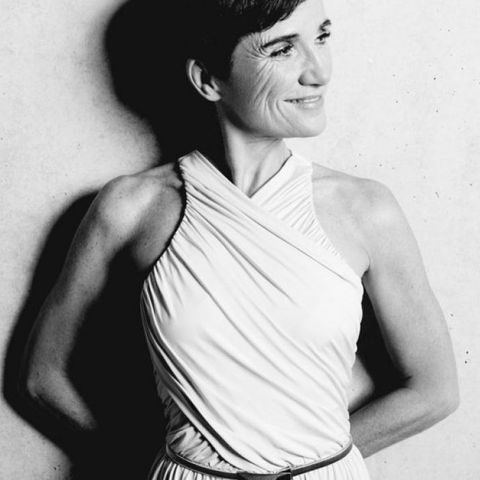Cazú Zegers - Cazú Zegers Arquitectura

Download and listen anywhere
Download your favorite episodes and enjoy them, wherever you are! Sign up or log in now to access offline listening.
Description
Cazú Zegers, guest of this appointment, is a leading architect in the Latin America panorama. Finished her studies at the Pontificia Universidad Católica in Valparaíso, Chile, she founded her own...
show moreHer first house, Casa Cala, a compendium of poetry and territory, embracing, according to her methodology, a gesture, a figure, and a form, was rewarded the prestigious Buenos Aires Biennal of Architecture recognition in 1993.
Convinced of the fundamental importance for Chile and Latin America to find and develop an own expression, representing their greatest value, their territory, landscape and traditions, she has elaborated a proper local language, combining vernacular with contemporary references, proposing new narratives of high impact, with low-tech sustainable building solutions. Her light way to inhabit the space perpetrates the profound respect that indigenous people nurture towards their natural habitat.
Her distinctive architecture, ranging from private residences, large hotels and sacred buildings to territorial planning, ruralization and multicultural projects in close interaction with local communities, has been internationally published, acknowledged the Grand Prix of Versalles, the National Geographic Unique Lodge of the World and the Latin American Grand Prize for Architecture, among others.
Extremely active, Cazú Zegers has been founder and promoter of many initiatives and organisations, as A.I.R.A. Workshop, the Foundation and Center for Geopoetic Studies, later re-founded as a Foundation +1000, creator of “invisible workshop", referencing the invisibility of women artists in Chile, named for her determined involvement among the Latin American architects who break down barriers by Forbes Magazine in 2020.
Frequently lecturer in Chile and abroad, visiting professor at Yale University, Chile Brand Ambassador in 2018, she has been selected part of Architecture A-List of ELLE Decor, awarded the Dora Riedel distinction for her innovative work, opening new paths in the profession.
Passionate of arts, she has chosen architecture and we start the conversation focalising on the need she urgently felt, many years ago, for a practice more open, rekindled by multiple, different energies. We dwell on her interest in an ethno-architectural investigation, a passion she has cultivated since very young, travelling and sharing time and experiences with indigenous communities and we reserve then a series of considerations about difficult situations, as prejudices against women as architects, that have led her to react with great determination and positivity, founding her own independent practice and introducing with success her own idiom, establishing for other women an extremely encouraging and significant example. Casa Cala, her first house built, rewarded the Buenos Aires Biennal of Architecture recognition, is emblematic of her new conceptual reflection on an architecture nurtured by nature. Object of another important reflection is Kawelluco ruralisation, an extensive land of over 1000ha, between forests and a river, of which only 400ha has been developed, leaving the rest as park, minimising roads for cars and implementing tracks for horses. Zegers’ efforts to preserve the natural context, almost completely self-sufficient, supporting culture, and helping the survival of local community, show, after more than 20 years, the farsightedness of her sustainable vision, guaranteeing today an area, only 15 minutes from an important city where it is possible to feel the experience to be in the wilderness.
Kawelluco is a seismic territory, like large part of Chile, and to inhabit in a light and precarious way is a paradigm that must drive selection of materials and construction systems, as demonstrate the simple, minimal structures, immersed in the forest, adopted by Cazú. The love-story between Cazú and Chilean nature has inspired another famous, extremely seductive romance between her architecture and landscape. In a powerful, magical natural corner of Patagonia arises, like one of the many dunes created by the strong wind, Hotel of the Wind, an addition that, perfectly harmonised with the spectacular context, interacts as an ‘old fossil’ with the pristine, uncontaminated setting.
Other two houses are explored as strongly representative of an architecture able to transform and ‘whisper’. House Emerald, conceived for the mother, a structure open, at the core and along the four sides, to the landscape, embodies and transmits the aspiration to live completely free, without restrains and enclosures, while Casa Soplo, the so called ’ Whisper House’, seems to nourish a conversation with the emotional part of the inhabitants. The conversation concludes touching her active involvement in collaborative, educational programs for young, as the Andes Workshop, an experimental exercise she has conceived with Grupo Talca, offering experiences for students, graduated architects, combining the opportunity to approach local culture and processes, living and working 2 months with a multidisciplinary team, in contact with the community.
Information
| Author | Floornature.com |
| Organization | Floornature.com |
| Website | - |
| Tags |
Copyright 2024 - Spreaker Inc. an iHeartMedia Company

Comments